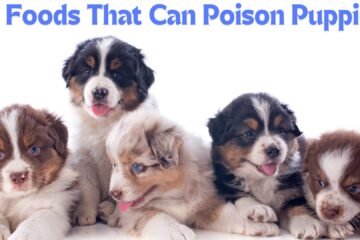The quest for the perfect pet diet is an adventure that every pet owner embarks on with both curiosity and concern. What makes this journey especially intriguing is the diversity of the animal kingdom and the unique dietary needs of each creature within it.
Hamsters, those endearing little balls of fur, are no exception. Many hamster owners venture beyond traditional hamster food, exploring varied and more vibrant food options to enrich their pet’s diet and ensure it remains both nutritious and stimulating.
This exploration often leads to one intriguing question: Can hamsters eat dog food, including specialized brands like Ollie?
This blog aims to delve into this query, offering the latest and most accurate information to determine whether dog food can be a safe and nutritious option for your hamster.
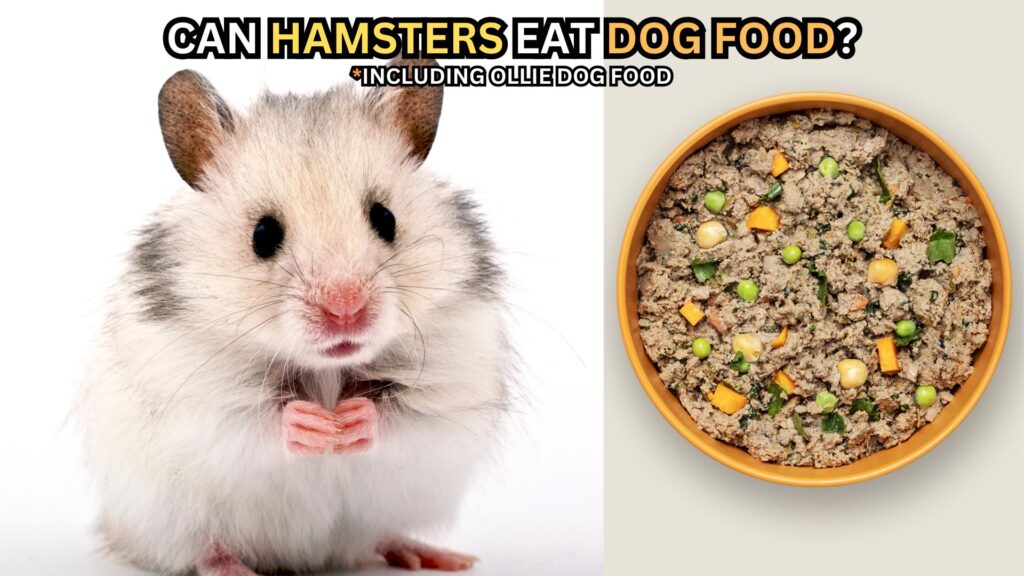
Nutritional Needs of Hamsters
Hamsters are omnivores, meaning their diet in the wild includes a mix of plant-based materials and protein sources, such as insects. To replicate this balanced diet, a domestic hamster’s diet should include grains, vegetables, fruits, and a small amount of protein.
Essential nutrients for hamsters include vitamins, minerals, fiber, and especially a balanced ratio of proteins and fats to support their high energy levels.
🐹Can Hamsters Safely Eat Dog Food?
However, when considering dog food for hamsters, it’s crucial to understand the general suitability and the nutritional profile of dog food in comparison to what hamsters typically need.
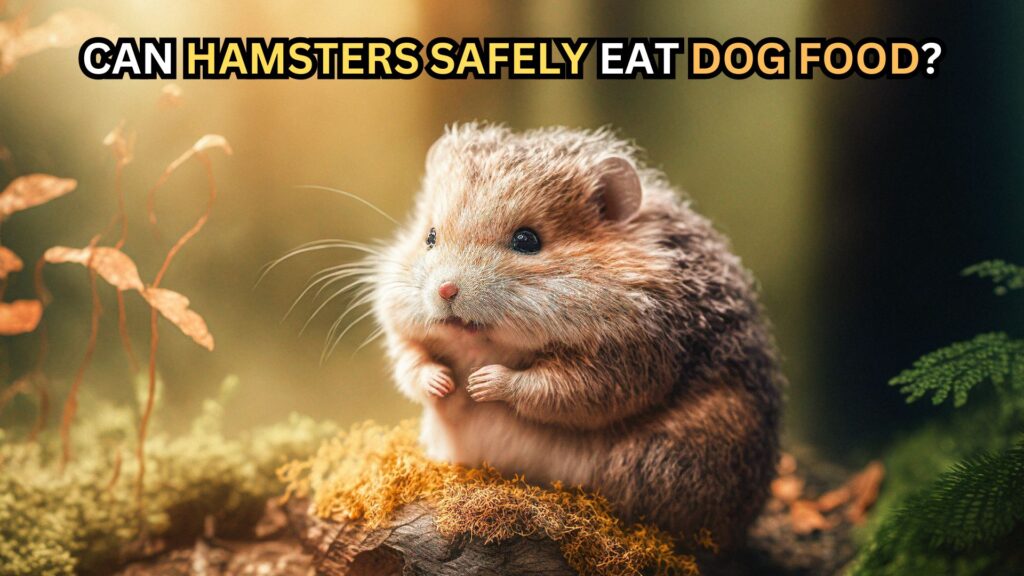
General Suitability of Dog Food for Hamsters
Dog food, at its core, is formulated to meet the nutritional requirements of dogs, not hamsters. Dogs are primarily carnivorous, although they can have an omnivorous diet, which means their food is rich in proteins and fats but may lack certain nutrients essential for hamsters.
Nutritional Differences
The key nutritional differences between dog food and an ideal hamster diet revolve around the protein and fiber content, as well as the inclusion of certain vitamins and minerals.
Dog food often contains higher protein levels than what is recommended for hamsters, which can lead to obesity and other health issues in hamsters if fed regularly.
Furthermore, the fiber content in dog food may not meet the dietary fiber needs of hamsters, which is crucial for their digestive health.
Potential Health Risks or Benefits
Feeding your hamster dog food, including high-quality brands like Ollie, might not pose an immediate threat if done sparingly. However, long-term feeding can lead to nutritional imbalances.
For instance, excessive protein can result in kidney and liver problems, while insufficient fiber can cause digestive issues.
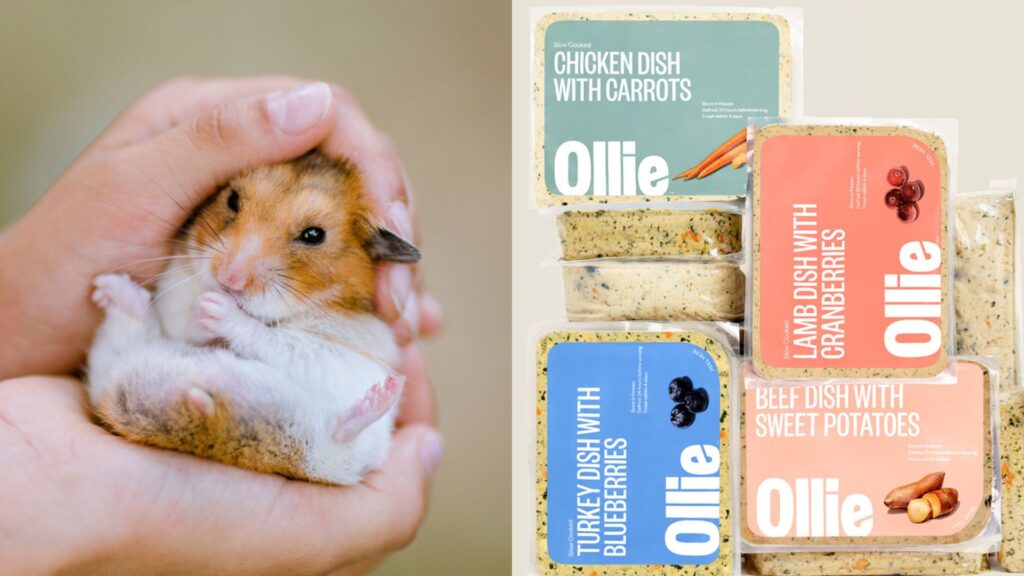
On the other hand, a small amount of dog food could potentially provide a protein boost if your hamster’s diet lacks adequate protein sources. Yet, this should be considered only as a supplementary measure, not a dietary staple.
While the curiosity to offer a diverse diet to your hamster is commendable, it’s essential to prioritize their unique nutritional needs over convenience or experimentation.
Dog food, even from specialized brands like Ollie, is formulated with canines in mind and does not adequately cater to the dietary requirements of hamsters.
To ensure your hamster enjoys a long, healthy, and happy life, sticking to a diet specifically designed for them, supplemented with occasional fresh fruits, vegetables, and appropriate protein sources, is the best course of action.
A Closer Look at Ollie Dog Food
Ollie dog food has gained recognition for its high-quality, human-grade ingredients and personalized meal plans, aimed at catering to the specific nutritional needs of dogs.
With a focus on fresh meats, fruits, and vegetables, Ollie emphasizes whole-food ingredients without fillers or artificial additives.
This approach ensures that dogs receive a balanced diet, rich in protein, essential fats, vitamins, and minerals.
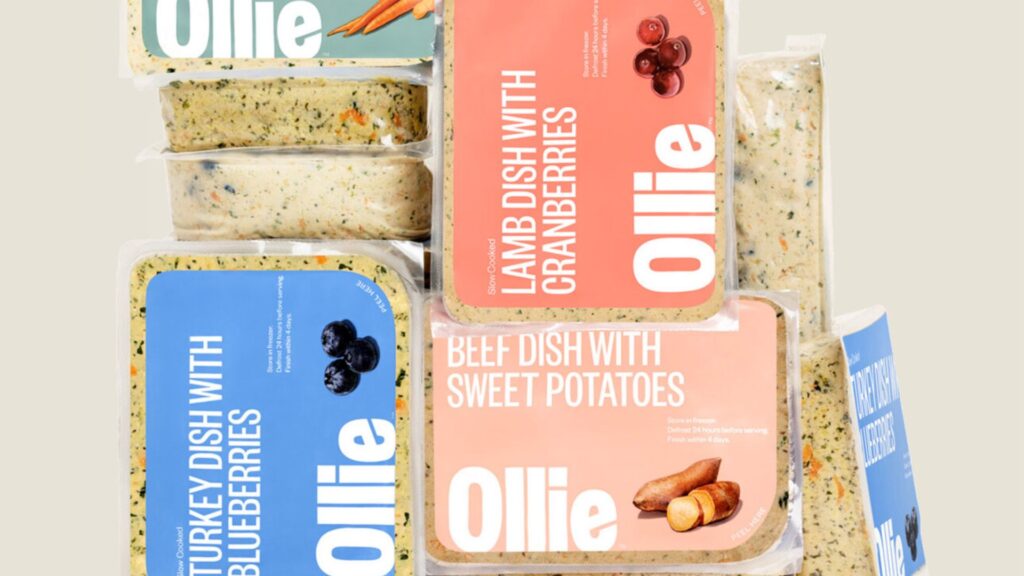
Nutritional Profile and Hamsters’ Dietary Needs
While Ollie’s commitment to quality is commendable, it’s crucial to analyze whether its nutritional profile aligns with the needs of hamsters. Given that hamsters require a diet with a balance of proteins, fats, fibers, vitamins, and minerals, dog food, even of high quality like Ollie’s, is formulated with a different species in mind.
The high protein content in dog food, beneficial for canines, exceeds what is recommended for hamsters, potentially leading to health issues if fed regularly.
Furthermore, the specific blends of vitamins and minerals tailored for dogs may not meet the dietary requirements of hamsters.
Beneficial or Harmful Ingredients
Ingredients commonly found in Ollie dog food, such as lean meats and certain vegetables, could potentially offer some nutritional benefits to hamsters in very small quantities.
However, the inclusion of some ingredients, like garlic and onions, which are harmful to hamsters, alongside the disproportionate macronutrient ratios, poses a risk.
The key takeaway is that even the most premium dog food brands contain elements not suitable for the delicate balance of a hamster’s diet.
Alternatives to Dog Food for Hamsters
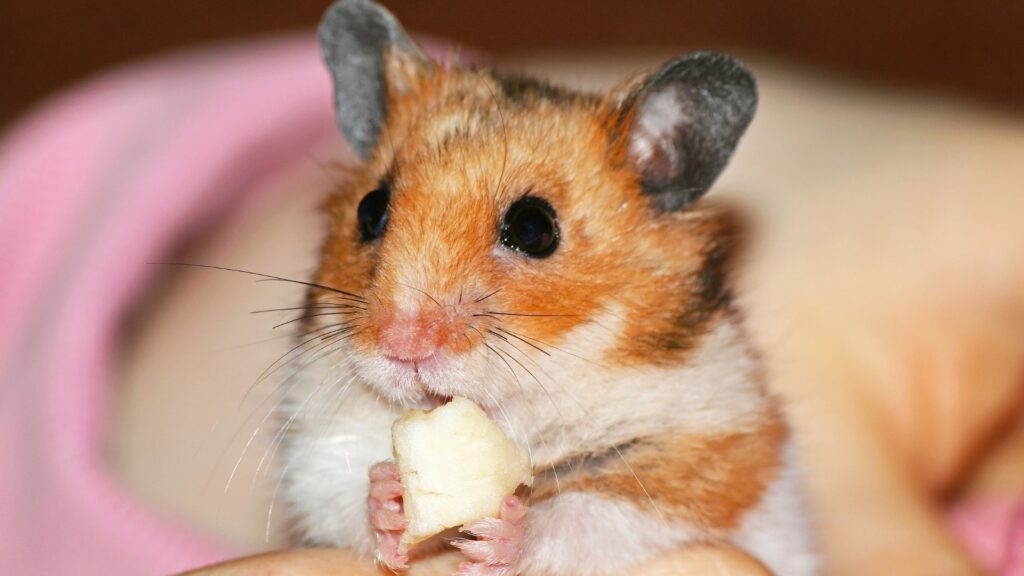
To ensure the health and happiness of your hamster, consider these healthier, more suitable dietary alternatives:
- Balanced Commercial Hamster Food: These mixes are specially formulated to meet all the nutritional needs of hamsters, including proteins, fibers, vitamins, and minerals.
- Fresh Fruits and Vegetables: Offering small amounts of hamster-safe fruits and veggies can provide essential nutrients and variety. Examples include carrots, apples (without seeds), and leafy greens.
- Protein Sources: Cooked eggs, plain tofu, and occasional small pieces of chicken can supplement your hamster’s protein intake appropriately.
Introducing New Foods
When introducing new foods to your hamster’s diet, do so gradually to avoid digestive upset. Start with tiny amounts and observe your pet for any adverse reactions or changes in behavior.
FAQs
Can hamsters eat any type of dog food?
No, they can’t eat all dog foods. Some dog foods contain ingredients that are toxic to hamsters. While small amounts might not be immediately harmful, dog food is not recommended for hamsters due to nutritional imbalances.
Are there any specific ingredients in dog food that hamsters should avoid?
Yes, ingredients like garlic, onions, and high-fat meats should be avoided as they can be harmful to hamsters.
How often can I feed my hamster dog food?
It’s best not to make dog food a part of your hamster’s diet due to the potential health risks.
What are the signs of nutritional deficiencies or excess in hamsters?
Look out for signs like weight loss or gain, lethargy, fur loss, or digestive issues.
Can feeding my hamster dog food affect its behavior or health in the long term?
Yes, improper diet can lead to health and behavioral issues, including obesity, nutritional deficiencies, and more.
Conclusion
The exploration into whether hamsters can eat dog food, including premium brands like Ollie, reveals significant nutritional mismatches that make it unsuitable for these small pets. The focus should remain on providing a balanced diet tailored to the specific needs of hamsters, which includes commercial hamster food, along with healthy supplements of fresh fruits, vegetables, and appropriate protein sources.
Feeding hamsters dog food, even sporadically, is not recommended due to the potential for nutritional imbalances and health risks. For the well-being of your furry friend, sticking to a diet designed for hamsters is the best approach.
For personalized advice on feeding and caring for your hamster, consulting with a veterinarian is always the best course of action. Their expertise can guide you in making the best dietary choices for your pet, ensuring they lead a long, healthy, and happy life.


